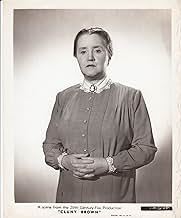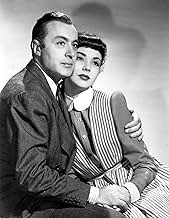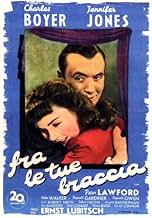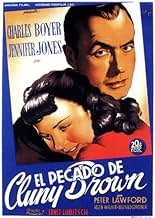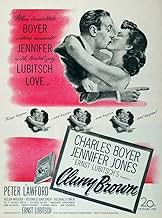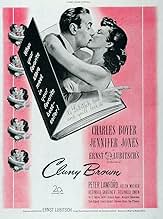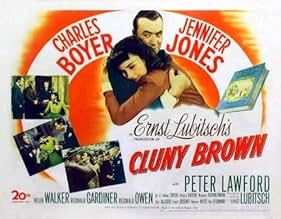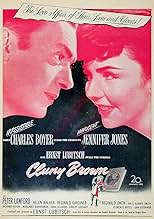IMDb रेटिंग
7.4/10
4.3 हज़ार
आपकी रेटिंग
अपनी भाषा में प्लॉट जोड़ेंA free-spirited parlor maid and a Czech refugee surprise an English village with their unconventional ways.A free-spirited parlor maid and a Czech refugee surprise an English village with their unconventional ways.A free-spirited parlor maid and a Czech refugee surprise an English village with their unconventional ways.
C. Aubrey Smith
- Col. Charles Duff Graham
- (as Sir C. Aubrey Smith)
Norman Ainsley
- Mr. Tupham
- (बिना क्रेडिट के)
Billy Bevan
- Uncle Arn Porritt
- (बिना क्रेडिट के)
Whit Bissell
- Archie
- (बिना क्रेडिट के)
Bette Rae Brown
- Girl at Party
- (बिना क्रेडिट के)
Charles Coleman
- Constable Birkins
- (बिना क्रेडिट के)
कहानी
क्या आपको पता है
- ट्रिवियाThis was the last film director Ernst Lubitsch completed himself. He died the following year during the filming of That Lady in Ermine (1948).
- गूफ़When Cluny and Adam and Hilary are in Hilary's living room, just after Cluny says "It's so wonderful to be a cat and read the Daily Mail," the boom mic can be seen in the mirror above Adam's head.
- भाव
Adam Belinski: In Hyde Park, for instance, some people like to feed nuts to the squirrels. But if it makes you happy to feed squirrels to the nuts, who am I to say, "nuts to the squirrels?"
- कनेक्शनEdited into I Love Lucy: The Fox Hunt (1956)
फीचर्ड रिव्यू
This is a very clever, witty, wacky, screwball, satire comedy of people, place and manners. From its source to the script, acting and production, "Cluny Brown" is a masterpiece of film comedy. This is one of the cleverest, funniest and most entertaining movies I've ever seen. The script is witty, filled with hilarious dialog, and sprinkled with frequent clever sidesteps and detours. Such would normally make a film disjointed and hard to follow. But here the short distractions work beautifully to make it like a screwball comedy. All of this makes for a very funny, wacky and subtly satirical film.
The film begins in London in June of 1938. World War II had not yet begun. The book on which the film is based, was a 1944 novel of the same title. The world was deeply into the war when Margery Sharp wrote the novel, but the outcome was far from certain. Yet, the war was well over by the summer of 1946 when this film came out. Part of the spoofery of the film is of the ignorance about the world scene among some of the upper peerage of England.
Ernst Lubitsch directed some of the best political satire films, and this was the last movie he completed before his death in 1947 of a heart attack at age 55. Besides a great plot and excellent screenplay, this film has a marvelous cast. The acting is superb from the leads down to the smallest of roles. The supporting cast reads like a who's who of U.K. actors of the day.
The script is so chock-full of humor that this film needs a second, third and even fourth viewing. It gets better each time as one notices more of the short retorts, smart snippets and wacky lines. Many of the cast were worthy of Oscar nominations in 1946. But it was a year of many great films, most of which were serious fare in the aftermath of war. Still, "Cluny Brown" was a hit on both sides of the pond. Had it been made three or four years later, it surely would have captured some major awards.
As Cluny, Jennifer Jones shows her aptitude for comedy as well as drama. She was nominated for an Oscar in another film of 1946, the Western drama, "Duel in the Sun." She won an Oscar and Golden Globe for "The Song of Bernadette" in 1943. Jones clearly is one of the great actresses of the silver screen.
Cluny's fixation for plumbing is matched by Adam Belinski's observance of the squirrels and nuts in Hyde Park. Charles Boyer is at his comedic best as the Czech writer who fled his native Budapest ahead of the Nazis.
Each one of the rest of the cast who play English lords, ladies, servants and tradesmen, is ideal in his or her role. Reginald Owen is hilarious as Sir Henry Carmel. Margaret Bannerman has a role much like one that Billie Burke often played. She is something of a dingbat with moments of clarity. Peter Lawford is very funny as Andrew Carmel, and Helen Walker is a scream as Betty Cream. The pretentious Andrew can't stand the pretentious Cream, but he pines for her constantly. Richard Haydn is howlingly funny as the snobbish chemist (we Yanks would call him a druggist), Jonathan Wilson. Una O'Connor was never funnier, without saying a single word. The servants of the Carmels are a hoot, and Reginald Gardiner, Billy Bevan and all the rest provide shots of humor.
Author Margery Sharp (1905-1991) was a sort of Jane Austen of the 20th century. With more than two dozen novels and many short stories and plays to her credit, she was well known. A number of her stories have been put on film. "Julia Misbehaves" of 1948 is another great comedy with Greer Garson, Walter Pidgeon, and Cesar Romero.
Here are some favorite lines from this film. For more great dialog, see the Quotes section under this IMDb Web page of the movie.
Hilary Ames, "If plumbing's going to make a go of it in this country, the plumbers jolly well better get into the spirit of the thing."
Andrew Carmel, "Good heavens." Betty Cream, "What's the matter?" Andrew, "It's Belinski." ... Betty, "Is he a gangster?" Andrew, "Don't be an idiot, Betty. He's a Czech."
Sir Henry Carmel, "You mean to tell me young girls go in for plumbing nowadays?... When I was a young man, we never even discussed plumbing. As a matter of fact, we didn't have any."
Lady Alice Carmel, "If England must produce Belinskis, why we will produce Belinskis. Britain has never failed. Now have your tea, dear."
Andrew Carmel, "Oh, you can't call a man broke just because he hasn't any money."
Lady Alice Carmel, "So many foreigners do have foreign names, don't they?"
Syrette, "What do you expect? Maid without references, and a foreigner who isn't even in the diplomatic service."
Cluny Brown, "Poor little sheep. It hasn't much future, has it? Just mutton." Jonathan Wilson, "And where would England be without it? If I was a sheep, I should be proud to serve the empire."
Jonathan Wilson, "Mother doesn't waste words on flattery. If she speaks, it's to correct faults."
Adam Belinski, "No, Sir Henry. I know Hitler." Sir Henry Carmel, "Oh, yes, he's written a book, hasn't he?... What's it called? Oh, yes, "My Camp." Belinski, "Yes, it's a kind of outdoor book. The old German idea of sport. Not your kind of sport.
Syrette, "I shall never forget the day she dusted the left eye out of Sir Henry's moose."
Cluny Brown, "You know, Mr. Belinski, men just don't marry plumbers."
Cluny Brown, "He told me what he thought of me. Some of it was in Latin."
The film begins in London in June of 1938. World War II had not yet begun. The book on which the film is based, was a 1944 novel of the same title. The world was deeply into the war when Margery Sharp wrote the novel, but the outcome was far from certain. Yet, the war was well over by the summer of 1946 when this film came out. Part of the spoofery of the film is of the ignorance about the world scene among some of the upper peerage of England.
Ernst Lubitsch directed some of the best political satire films, and this was the last movie he completed before his death in 1947 of a heart attack at age 55. Besides a great plot and excellent screenplay, this film has a marvelous cast. The acting is superb from the leads down to the smallest of roles. The supporting cast reads like a who's who of U.K. actors of the day.
The script is so chock-full of humor that this film needs a second, third and even fourth viewing. It gets better each time as one notices more of the short retorts, smart snippets and wacky lines. Many of the cast were worthy of Oscar nominations in 1946. But it was a year of many great films, most of which were serious fare in the aftermath of war. Still, "Cluny Brown" was a hit on both sides of the pond. Had it been made three or four years later, it surely would have captured some major awards.
As Cluny, Jennifer Jones shows her aptitude for comedy as well as drama. She was nominated for an Oscar in another film of 1946, the Western drama, "Duel in the Sun." She won an Oscar and Golden Globe for "The Song of Bernadette" in 1943. Jones clearly is one of the great actresses of the silver screen.
Cluny's fixation for plumbing is matched by Adam Belinski's observance of the squirrels and nuts in Hyde Park. Charles Boyer is at his comedic best as the Czech writer who fled his native Budapest ahead of the Nazis.
Each one of the rest of the cast who play English lords, ladies, servants and tradesmen, is ideal in his or her role. Reginald Owen is hilarious as Sir Henry Carmel. Margaret Bannerman has a role much like one that Billie Burke often played. She is something of a dingbat with moments of clarity. Peter Lawford is very funny as Andrew Carmel, and Helen Walker is a scream as Betty Cream. The pretentious Andrew can't stand the pretentious Cream, but he pines for her constantly. Richard Haydn is howlingly funny as the snobbish chemist (we Yanks would call him a druggist), Jonathan Wilson. Una O'Connor was never funnier, without saying a single word. The servants of the Carmels are a hoot, and Reginald Gardiner, Billy Bevan and all the rest provide shots of humor.
Author Margery Sharp (1905-1991) was a sort of Jane Austen of the 20th century. With more than two dozen novels and many short stories and plays to her credit, she was well known. A number of her stories have been put on film. "Julia Misbehaves" of 1948 is another great comedy with Greer Garson, Walter Pidgeon, and Cesar Romero.
Here are some favorite lines from this film. For more great dialog, see the Quotes section under this IMDb Web page of the movie.
Hilary Ames, "If plumbing's going to make a go of it in this country, the plumbers jolly well better get into the spirit of the thing."
Andrew Carmel, "Good heavens." Betty Cream, "What's the matter?" Andrew, "It's Belinski." ... Betty, "Is he a gangster?" Andrew, "Don't be an idiot, Betty. He's a Czech."
Sir Henry Carmel, "You mean to tell me young girls go in for plumbing nowadays?... When I was a young man, we never even discussed plumbing. As a matter of fact, we didn't have any."
Lady Alice Carmel, "If England must produce Belinskis, why we will produce Belinskis. Britain has never failed. Now have your tea, dear."
Andrew Carmel, "Oh, you can't call a man broke just because he hasn't any money."
Lady Alice Carmel, "So many foreigners do have foreign names, don't they?"
Syrette, "What do you expect? Maid without references, and a foreigner who isn't even in the diplomatic service."
Cluny Brown, "Poor little sheep. It hasn't much future, has it? Just mutton." Jonathan Wilson, "And where would England be without it? If I was a sheep, I should be proud to serve the empire."
Jonathan Wilson, "Mother doesn't waste words on flattery. If she speaks, it's to correct faults."
Adam Belinski, "No, Sir Henry. I know Hitler." Sir Henry Carmel, "Oh, yes, he's written a book, hasn't he?... What's it called? Oh, yes, "My Camp." Belinski, "Yes, it's a kind of outdoor book. The old German idea of sport. Not your kind of sport.
Syrette, "I shall never forget the day she dusted the left eye out of Sir Henry's moose."
Cluny Brown, "You know, Mr. Belinski, men just don't marry plumbers."
Cluny Brown, "He told me what he thought of me. Some of it was in Latin."
टॉप पसंद
रेटिंग देने के लिए साइन-इन करें और वैयक्तिकृत सुझावों के लिए वॉचलिस्ट करें
- How long is Cluny Brown?Alexa द्वारा संचालित
विवरण
- रिलीज़ की तारीख़
- कंट्री ऑफ़ ओरिजिन
- भाषाएं
- इस रूप में भी जाना जाता है
- Cluny Brown auf Freiersfüßen
- फ़िल्माने की जगहें
- उत्पादन कंपनी
- IMDbPro पर और कंपनी क्रेडिट देखें
बॉक्स ऑफ़िस
- दुनिया भर में सकल
- $17,155
- चलने की अवधि1 घंटा 40 मिनट
- रंग
- पक्ष अनुपात
- 1.37 : 1
इस पेज में योगदान दें
किसी बदलाव का सुझाव दें या अनुपलब्ध कॉन्टेंट जोड़ें



